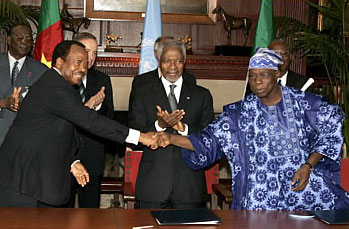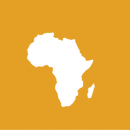Africa In Brief
Africa In Brief
The presidents of Nigeria and Cameroon signed an agreement in June ending their countries’ longstanding border dispute, with Nigeria pledging to withdraw its troops from the Bakassi Peninsula, an oil-rich region in the Gulf of Guinea, within 60 days. UN Secretary-General Kofi Annan described the accord as “a remarkable experiment in conflict prevention.” He praised President Olusegun Obasanjo of Nigeria and President Paul Biya of Cameroon for their “patience, tenacity, flexibility and restraint.”
 To mark settlement of Bakassi dispute, Cameroon President Paul Biya (left) shakes hands with Nigerian President Olusegun Obasanjo (right), as UN Secretary-General Kofi Annan (centre) applauds.
To mark settlement of Bakassi dispute, Cameroon President Paul Biya (left) shakes hands with Nigerian President Olusegun Obasanjo (right), as UN Secretary-General Kofi Annan (centre) applauds.The Bakassi Peninsula has been the object of intense conflict between the two countries for years, with tensions occasionally risking war. As recently as last year, two Cameroonian soldiers were killed in clashes. In 1994, Cameroon referred the border dispute to the International Court of Justice. In October 2002 the court ruled in favour of Cameroon, but Nigeria did not immediately accept the verdict. Subsequent talks were brokered by the Cameroon-Nigeria Mixed Commission, leading to Nigeria’s agreement to withdraw.
Poor countries promote good governance
Despite severe human resource constraints, many of the world’s 50 least developed countries (LDCs) have made significant progress in democratic governance over the past two decades, states a new UN report. The findings of the study, Governance for the Future: Democracy and Development in Least Developed Countries, challenge widespread skepticism about the ability of the poorest countries to attain stable democracies.
There are many “pioneering democratic governance initiatives” taking place in the world’s LDCs, 34 of which are in Africa, notes the report, produced by the UN Development Programme and the UN Office of the High Representative for Least Developed Countries, Landlocked Developing Countries and Small Island Developing States. “Some of the most efficient and creative solutions in overcoming development problems can be found in LDCs themselves,” says Under-Secretary-General Anwarul K. Chowdhury, who heads the LDCs office.
‘Grounds for optimism’ on African economic growth
Economic growth in Africa is likely to be very strong in 2006, according to a comprehensive report issued in May by the African Development Bank (ADB) and the industrialized countries’ Organization for Economic Cooperation and Development (OECD). The African Economic Outlook 2005/2006 predicts that average growth in the continent’s gross domestic product (GDP) will reach a robust 5.8 per cent this year, to be followed by 5.5 per cent in 2007.
Most African countries still face major challenges in cutting poverty and achieving the other internationally agreed Millennium Development Goals, note ADB President Donald Kaberuka and OECD Development Centre Director Louka Katseli. Nevertheless, they add, the improvements in growth provide “some grounds for optimism.”
Drawing on detailed analyses of 30 African countries – covering 86 per cent of the continent’s total population and 90 per cent of its economic output – the report credits several factors for the stronger growth. These include buoyant growth in both the OECD and Asia – which stimulated demand for African products – and a rise in world prices for African oil and metal exports. There also has been recovery from drought in several countries, increased private investment, more aid and debt relief, greater transparency in public management, a decline in political instability and advances in democracy.
Growth has been uneven, however, the report acknowledges. Moreover, the report admits, its forecasts for future growth are based on “somewhat optimistic assumptions.” World oil prices could remain higher than anticipated, obliging countries without oil to pay more for imports and thereby slowing their growth. There is some uncertainty whether external aid will continue to increase.
Speaking at the launch of the report, Under-Secretary-General Legwaila Joseph Legwaila, the new UN special adviser on Africa, welcomed its balance of economic analysis with attention to governance issues. “We know,” Mr. Legwaila said, “that fiscal and monetary reforms and economic restructuring in general, without the necessary improvements in political governance, will not lead to long-term solutions to Africa’s problems.”











